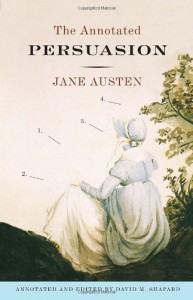The Last Austen: Weakness and Resentment

Persuasion was Jane Austen's final book. She died before completing the editorial process, which means that it is, perhaps, a little bit less polished than her other books, all of which were shined to a glass-like finish before being submitted for publication.
There are echoes of her other stories: Anne is a beaten down version of Lizzie - what Lizzie would have been if someone persuaded her to turn down a poorer Darcy in spite of her deep love for him. Captain Wentworth is an angrier Darcy - still resentful of the fact that his beloved was insufficiently strong-willed to stand up for herself and take him in spite of her family. William Elliot is an even more nauseating version of Mr. Wickham or Mr. Willoughby - more successful at being a self-serving, amoral douche, more adept at hiding his true nature.
Persuasion is darker and sadder. Anne has no one to look out for her best interests. Sure, Lady Russell means to do the job, but she is so easily swayed by appearances that, as it turns out, her advice is worse than useless, but is actively subverting Anne's happiness albeit unconsciously. And by the time the tale opens, Anne is firmly on the shelf, a woman of eight and twenty who has lost her looks and her charm and is no more than a body to support others, as all unmarried ladies are.
Her father overlooks her, her elder sister disdains her, and her younger sister uses her. And because she has a fine sensibility and intellect, she is perfectly capable of discerning these things and understanding that this is her life. Potentially forever. Unloved, unimportant, expected to simply extinguish herself in the service of others, becoming essentially a non-person. And because she is a non-person, she isn't even allowed to resent the advantage being taken of her, but rather, must respond with relentless chirping appreciation that she still has a place to live, even if her place is as little better than a kitchen maid.
It is truly difficult to decide who is the least likeable character in this book. Austen has sharpened her pen, but she has also become more subtle with age. None of these people are caricatures - there's no Mrs. Bennett, with her well-meaning but completely insane approach to marrying off her daughters, no Miss Bates, sweet but vacuous to the point of vacancy, no Lady Catherine DeBourgh, with her relentless self-absorption and superiority, no Mr. Collins, endlessly diverting with the intensity of his obsequiousness. The antagonists in Persuasion are still unlikeable, but they maintain a pretense of realism. And because of this, Persuasion is much less comic than Austen's other work, and much more painful.
And Anne, well, Anne is a bit difficult to admire. She is all that is admirable, but still, she feels weak. She was in love with Wentworth. Truly, deeply, madly in love, and she let him go because she was persuaded by her family to withdraw her acceptance. What does this say about her? And then, years later, she is forced to watch him pay attention to other women, to potentially fall in love with other, younger women. It hurts to be her - heck, it hurts to read about it.
She is not, however, guilty of the grievous sin of inconstancy that he has laid at her door. She has repined for Wentworth, never stopped loving him. And once he realizes that her sin is really an over-abundance of filial respect, as opposed to fickleness, the way is cleared for them to reunite.
Everyone knows Darcy's words from Pride and Prejudice, when his love for Lizzie overcomes him:
“In vain have I struggled. It will not do. My feelings will not be repressed. You must allow me to tell you how ardently I admire and love you.”"
Many fewer know Wentworth's impassioned words to Anne:
"“I can listen no longer in silence. I must speak to you by such means as are within my reach. You pierce my soul. I am half agony, half hope. Tell me not that I am too late, that such precious feelings are gone for ever. I offer myself to you again with a heart even more your own than when you almost broke it, eight years and a half ago. Dare not say that man forgets sooner than woman, that his love has an earlier death. I have loved none but you. Unjust I may have been, weak and resentful I have been, but never inconstant."
Has there ever been a better description of the exquisite disorientation of love than "I am half agony, half hope?"
I've read Persuasion many fewer times than I've read Pride and Prejudice, or even Sense and Sensibility or Emma. Prior to this reread, I would've said that it is my least favorite Austen save Northanger Abbey, which I have also never liked. I don't think that is still true.
I also loved the fact that Austen took aim at the broader cultural silencing and disempowerment of women (tongue firmly in cheek, of course, as the pen was in her hands):
Captain Harville: "But let me observe that all histories are against you — all stories, prose and verse. If I had such a memory as Benwick, I could bring you fifty quotations in a moment on my side the argument, and I do not think I ever opened a book in my life which had not something to say upon woman’s inconstancy. Songs and proverbs, all talk of woman’s fickleness. But perhaps you will say, these were all written by men.”Anne Elliot: “Perhaps I shall. Yes, yes, if you please, no reference to examples in books. Men have had every advantage of us in telling their own story. Education has been theirs in so much higher a degree; the pen has been in their hands. I will not allow books to prove anything.”






 12
12
 16
16
